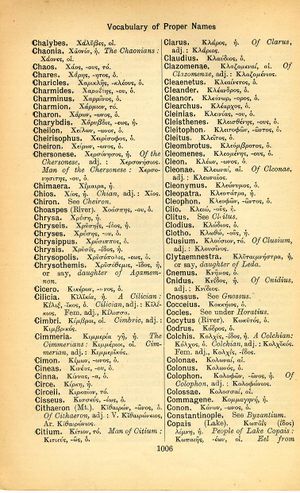Charmides: Difference between revisions
From LSJ
m (Text replacement - "link={{" to "link={{") |
m (Text replacement - "}}]]" to "}}]]") |
||
| Line 1: | Line 1: | ||
{{WoodhouseENELnames | {{WoodhouseENELnames | ||
|Text=[[File:woodhouse_1006.jpg|thumb | |Text=[[File:woodhouse_1006.jpg|thumb | ||
|link={{filepath:woodhouse_1006.jpg | |link={{filepath:woodhouse_1006.jpg}}]]Χαρμίδης, -ου, ὁ. | ||
}} | }} | ||
{{Lewis | {{Lewis | ||
Revision as of 10:10, 15 August 2017
English > Greek (Woodhouse)
Χαρμίδης, -ου, ὁ.
Latin > English (Lewis & Short)
Charmĭdes: ai or i, m.,
I a comic person in Plaut. Trin.; hence, charmĭdātus, changed into Charmides, id. ib. 4, 2, 135; cf. decharmido.
Latin > French (Gaffiot 2016)
Charmĭdes, āī et ī, m., personnage de comédie : Pl. Trin. 359 ; 744.
Latin > German (Georges)
Charmidēs, Genet. āī u. ī, m. (Χαρμίδης), griech. Eigenname, Plaut. trin. 149; Genet. āī, ibid. 359; Genet. ī, ibid. 744. – Dav. charmidor, ātus sum, āri, zum Charmides werden (im Doppelsinne mit χάρμα [die Freude] auch = sich erfreuen), Ggstz. se decharmidare, Plaut. trin. 977.

